Bosque Del Apache Festival Of The Cranes in 2025
Are you a bird-watching fan, with a particular interest in sandhill cranes and geese? Don’t miss our recommendations for incredible and memorable nature displays at the Bosque del Apache Festival of the Cranes. Wondering when the festival will take place in 2025? Need suggestions for overnight accommodations? Curious about the top spots for bird watching? We’ll guide you through the best experiences. Participation in the Sandhill Crane migration to their winter residence was one of our most fantastic bird-watching experiences. So in this article, we share experience and photography tips from the Bosque Del Apache Festival of The Cranes near Socorro, New Mexico.
This article may contain affiliate / compensated links. For full information, please see our disclaimer here.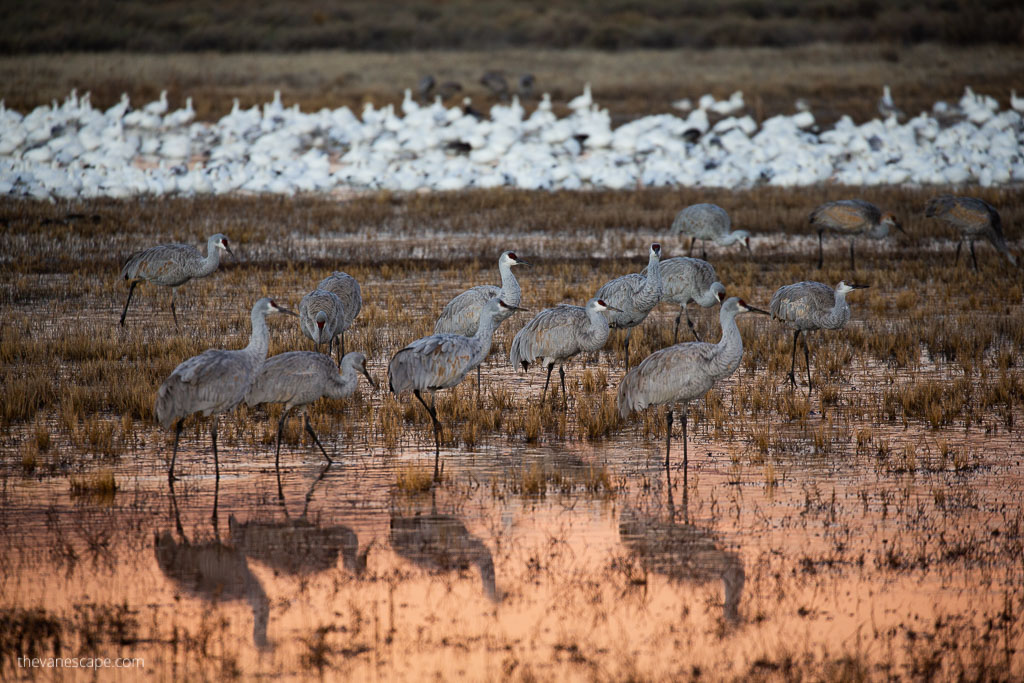
It was five in the morning in Bosque del Apache National Wildlife Refuge. It was so quiet. The sky was getting pink. There were hundreds of sleeping Sandhill Cranes in the water. Suddenly there was a strange noise in the air – the flutter of thousands of wings.
Then a loud gaggle broke up the silence. Thousands of Snow Geese appeared above the water, lifting Cranes from sleep. This magical spectacle of nature moved us. Unforgettable!
Where is Bosque del Apache National Wildlife Refuge?
Bosque del Apache National Wildlife Refuge is twenty miles south of Socorro, New Mexico. It’s about 95 miles and 1,5 hours of driving from Albuquerque, the closest major airport, so the place is worth visiting during your trip around New Mexico. It is located along the Rio Grande at the northern edge of the Chihuahuan desert.
Every year, the Wildlife Refuge holds a festival to celebrate the arrival of thousands of sandhill cranes. In 2025, the festival will be held from December 3 to 7.
This wildlife refuge in New Mexico is one of the preeminent sites in the US for photographing migratory birds. There have been over 350 different bird species observed in the Bosque del Apache National Wildlife Refuge, making it one of the most diverse areas for bird species in the United States. Socorro is the closest town to the refuge and the best place to stay overnight.
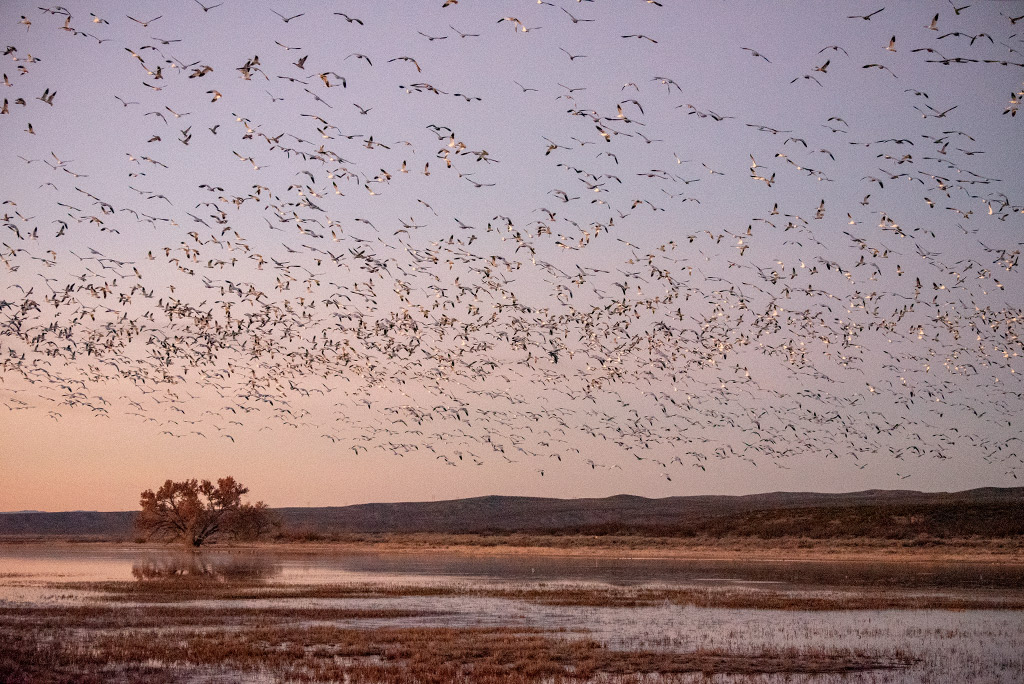
The over 57,000-acre refuge opened in 1939 to “provide a refuge and breeding ground for migratory birds and other wildlife.” It is also wintering grounds for the more enormous Sandhill Cranes.
Photographers and other visitors have access to a core area of nearly 13,000 acres for viewing and photographing birds and other wildlife. In addition to Sandhill Cranes, and Snow Geese is also a home for dozens of Bald Eagles, Great Blue Herons, Avocets, the occasional Pelican, and many other birds. It’s easy to see Coyotes and Mule Deer, as well.
The place is a real feast and an outdoor paradise for photographers and wildlife lovers. Since my partner Chris and I love watching and photographing birds, we spent four days in Bosque del Apache. All photos presented in this article are ours.
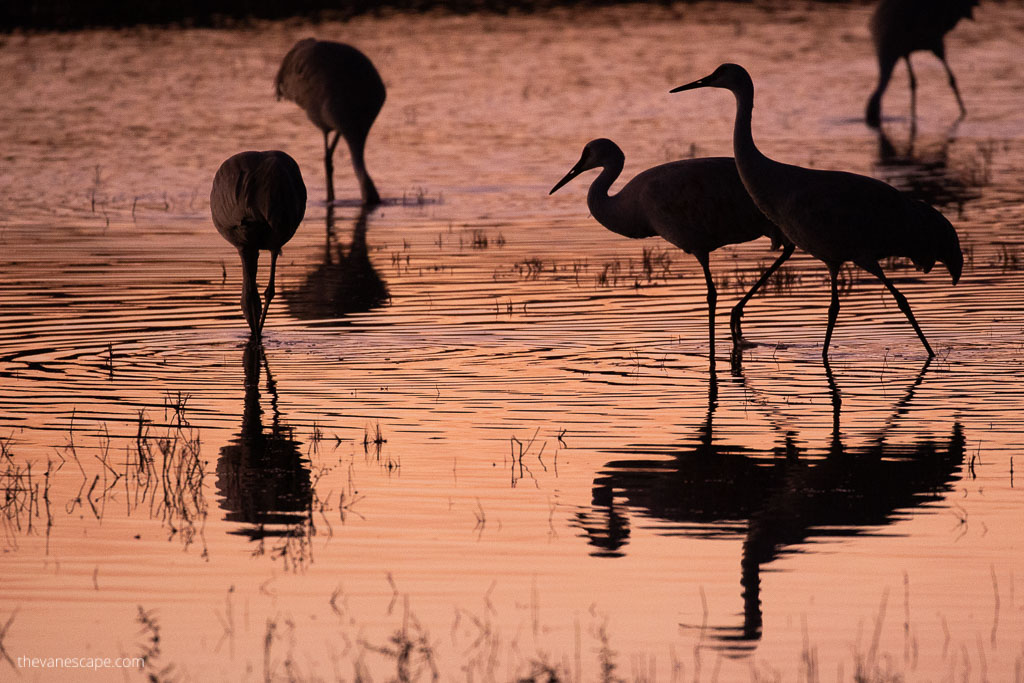
What is the Bosque Del Apache Festival Of The Cranes?
Bosque del Apache National Wildlife Refuge is the winter home of thousands of Sandhill Cranes, Snow Geese, Rosses Geese, ducks, and other waterfowl. Each year, the arrival of the Sandhill Cranes is celebrated by a several-day Bosque Del Apache Festival Of The Cranes each November, before Thanksgiving, or at the beginning of December.
The date is slightly different each year. In 2025, the festival will take place from December 3 to 7.
The Cranes and Snow Geese generally remain on the refuge until mid-February, when they return to their breeding grounds in the north. Thousands of Sandhill Cranes and thousands of Snow and Rosses Geese gather in Bosque del Apache to stay on the rich feeding grounds in central New Mexico through the winter.
It is an incredible spectacle of migration. From November to February, it’s home to around 14,000 Sandhill Cranes and over 32,000 Snow Geese and Ross’s Geese. So, the best time to visit Bosque is in these Winter months.
However, even with their departure, the refuge remains beautiful for hiking, biking, and wildlife- and bird-watching year-round.
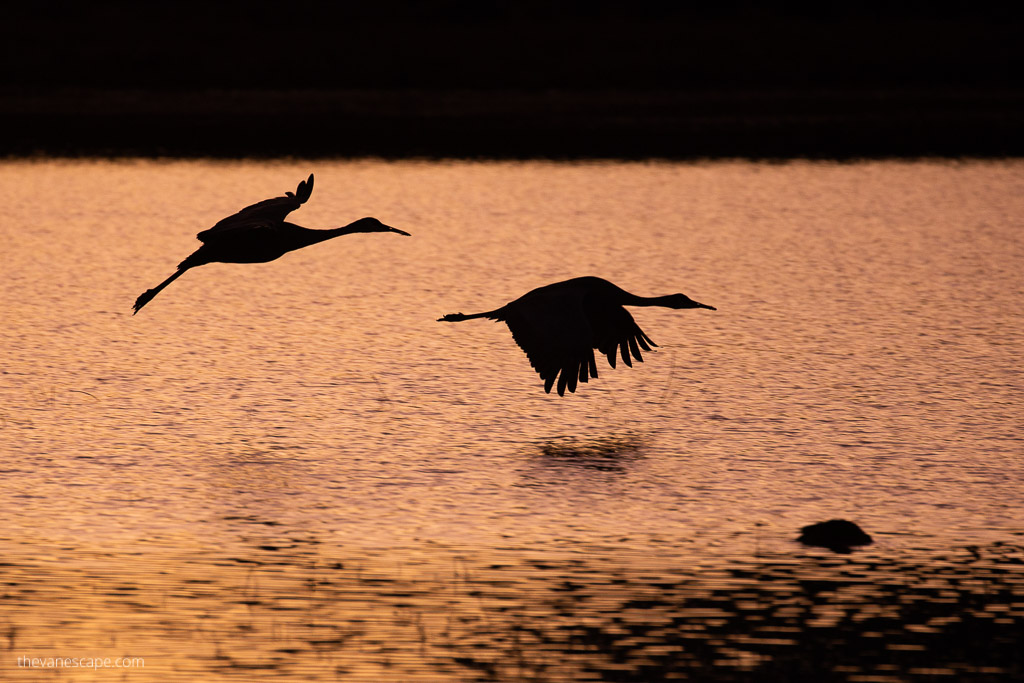
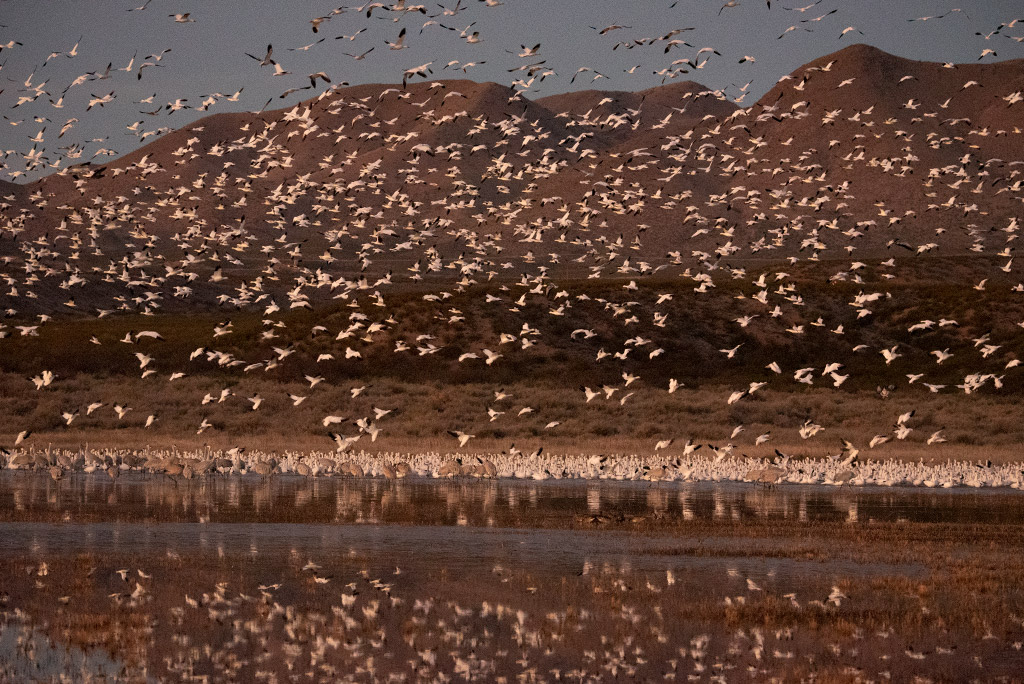
When is the next Bosque Del Apache Festival Of The Cranes 2025?
The official website lists the dates of the next festivals. According to the website, they are in the beginning stages of planning.
The Festival’s virtual elements will start the week after Thanksgiving 2025. But the in-person Festival of the Cranes 2025 is planned for December 3, 4, 5, 6 and 7 of 2025.
However, you can admire the cranes in this refuge for the next few months. And after the festival, without the crowds of tourists.
Where To Stay?
Socorro is the best place to stop for the night because you can reach the sunrise from the town in 20 minutes. So check hotels and book accommodation a few months earlier, especially if you plan to visit in November/December because this month is the Bosque del Apache Festival of The Cranes and is viral among nature lovers worldwide.
Holiday Inn Express Socorro and Best Western Socorro Hotel & Suites are our favorite hotels.
Bosque Del Apache Visitor Center
So, to reach the refuge from Socorro, head south on I-25 to the San Antonio exit. Follow the exit ramp, and you’ll wind up on SR 380 for about 1/4 mile, after which you’ll reach the light at Highway 1. Turn right (south). Around 9 miles, you’ll reach the Visitor Center on your right. The refuge entrance is on the left.
Bosque del Apache is open every day from one hour before sunrise to one hour after sunset. However, it is worth visiting Bosque Del Apache Visitor Center, to get a trail map and more info about the refuge (it is open from 8 a.m.).
Bosque del Apache National Wildlife Refuge offers many opportunities to enjoy wildlife-dependent activities, such as wildlife watching, hiking, photography, and more. How to visit this place?
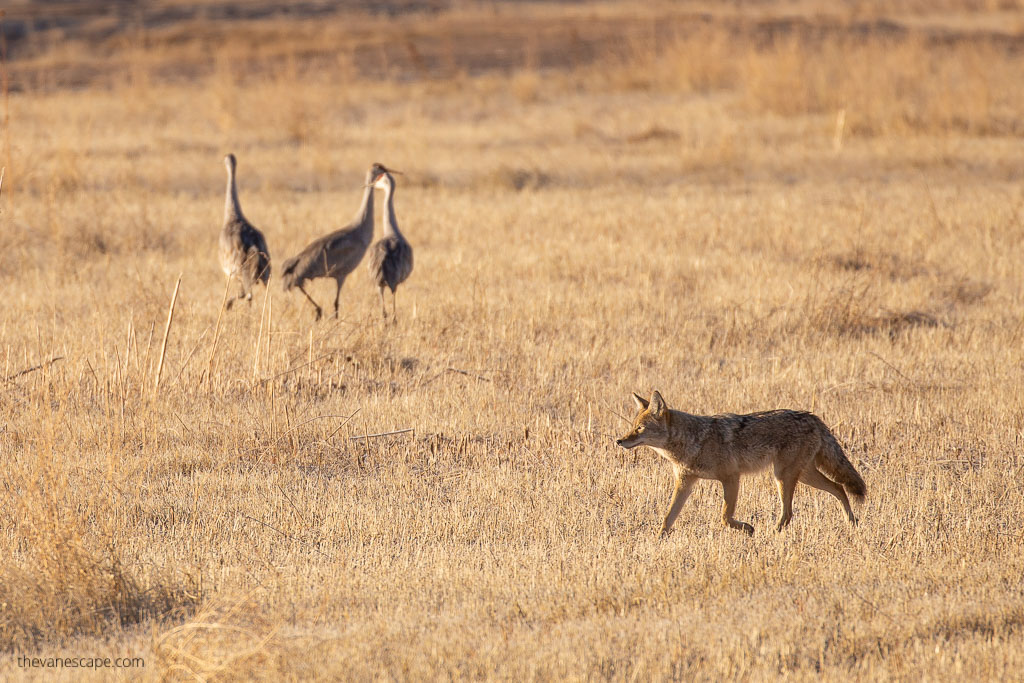
Auto Tour Route – tour loop
The best idea for wildlife watching is taking the tour loop. The auto tour loop is open year-round every day from one hour before sunrise to one hour after sunset. It is 12 miles long, bisected by a two-way road. However, you should know that you can also see cranes in a reservoir before the entrance to the park.
After morning fly-out, the Cranes spend the day foraging in open fields of dried and dead corn. There are several water reservoirs in the park (Cranes Pools/Ponds) where you can observe birds. The road is wide enough to stop on the side of the shoulders and photograph wildlife.
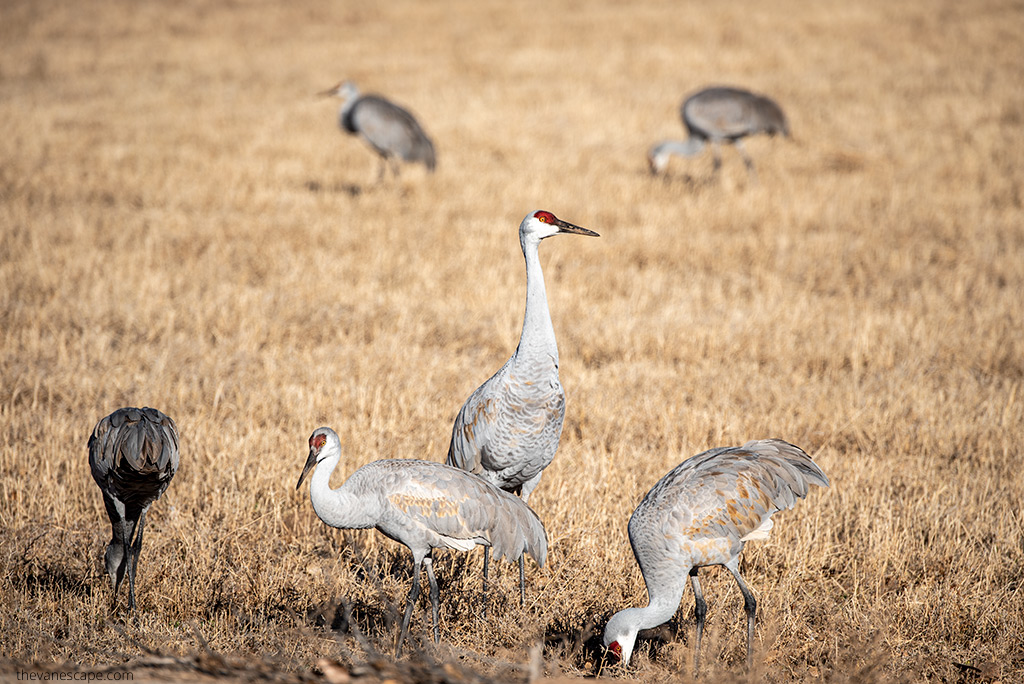
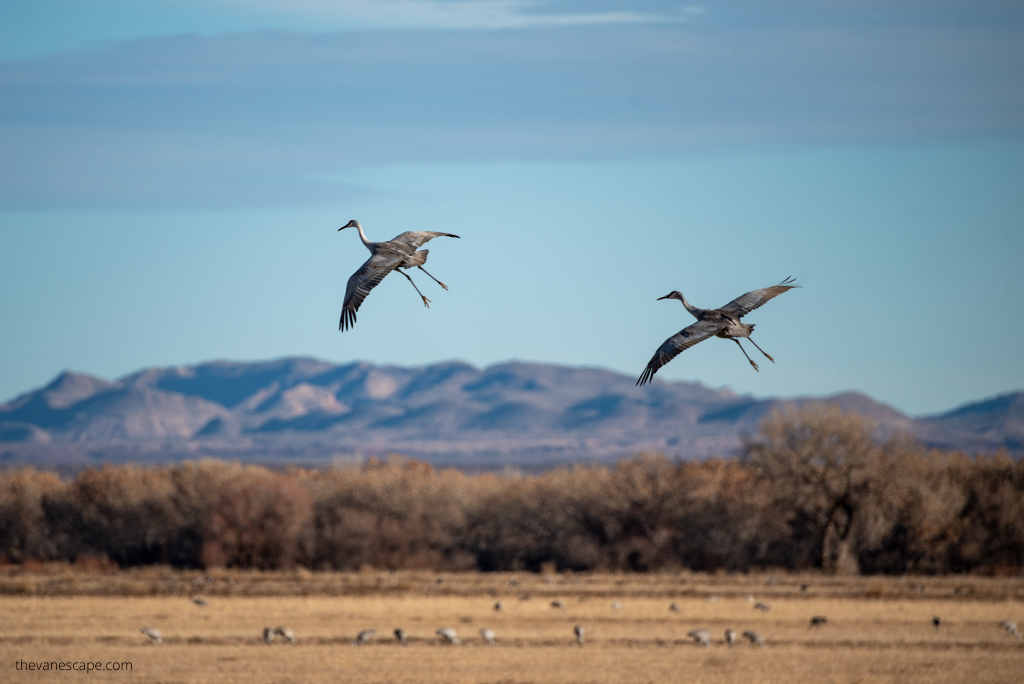
Hiking Trails
You’ll also find a series of trails in a Bosque that are usually short and relatively easy to hike. So, taking some trails is a great idea if you have more time. The best and shortest trails are the 1.5-mile Marsh Overlook Trail, the 2-mile Rio Viejo Trail, and the 0.5-mile Boardwalk Trail.
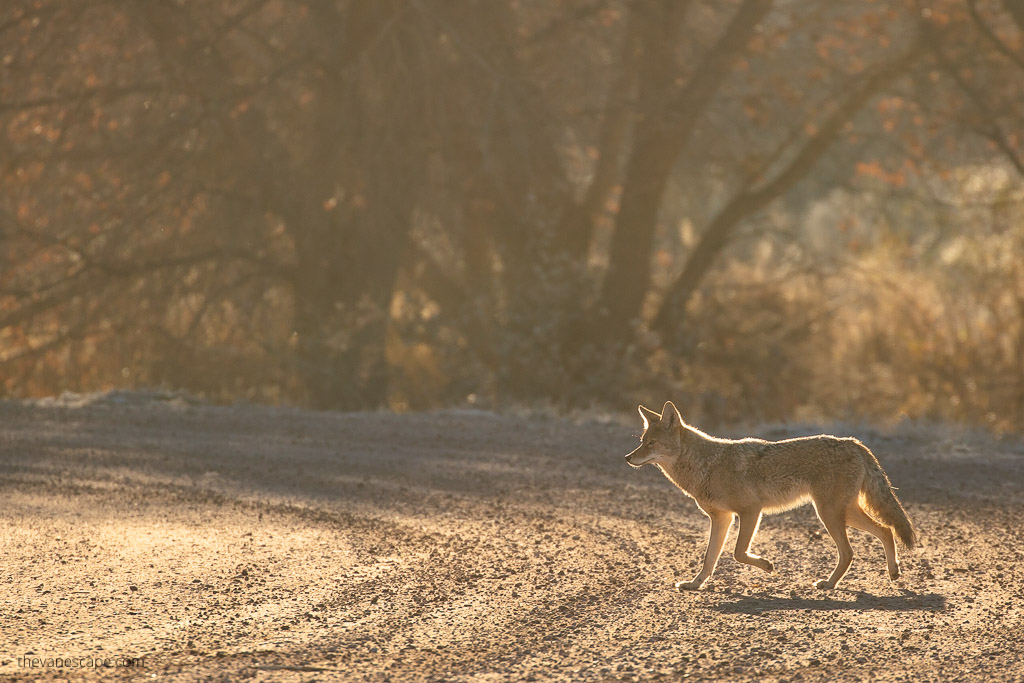
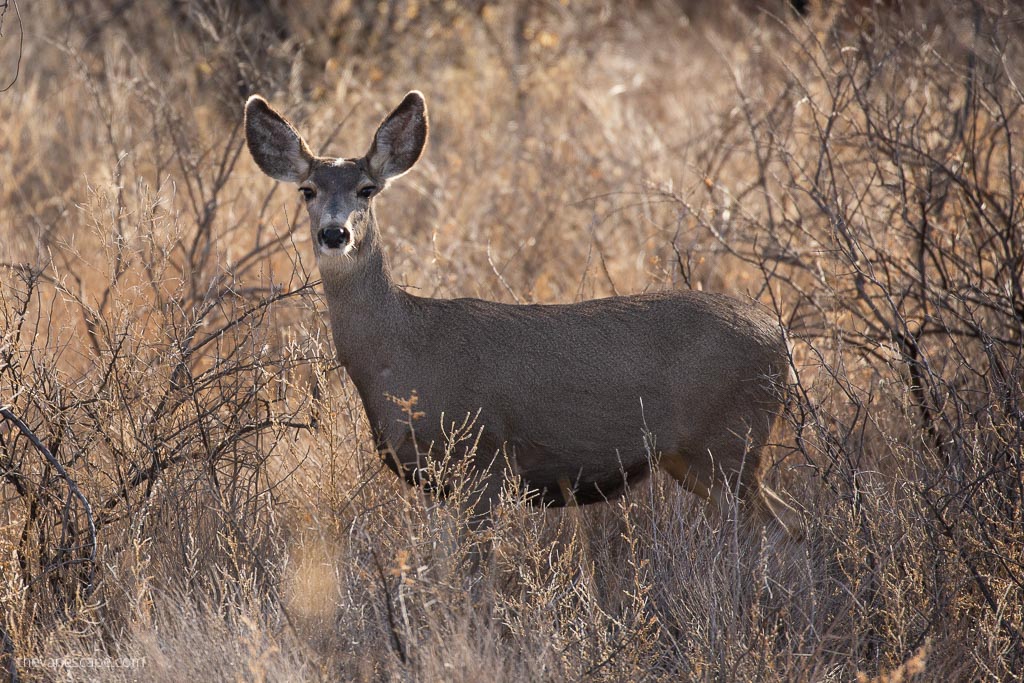
Bosque Del Apache Photography Tips
PROTIP: If you have little experience in birds & wildlife photography, check out our 10 essential steps to take to prepare for wildlife photography.
The photography opportunities in Bosque del Apache are remarkable. It is a paradise from almost an hour before sunrise until an hour after sunset.
Moreover, even during midday, you have opportunities for great shots when the birds are eating in the fields or swimming in the ponds. So pack your lunch and snacks with you. We spent three days there and now share the best tips with you.
Go For The Sunrise
Birds are the most active early in the morning. Go at least an hour before sunrise to set up the tripod and your photo equipment, and prepare for a magical spectacle. Many people visit the place so that it can be crowded. In the morning it is cold.
The refuge is at around 5000 feet elevation, so dress warmly. Furthermore, do not forget about the masking jacket and pants. You will be standing around for a long while, so also take a warm beanie, winter photography gloves, and dress layers.
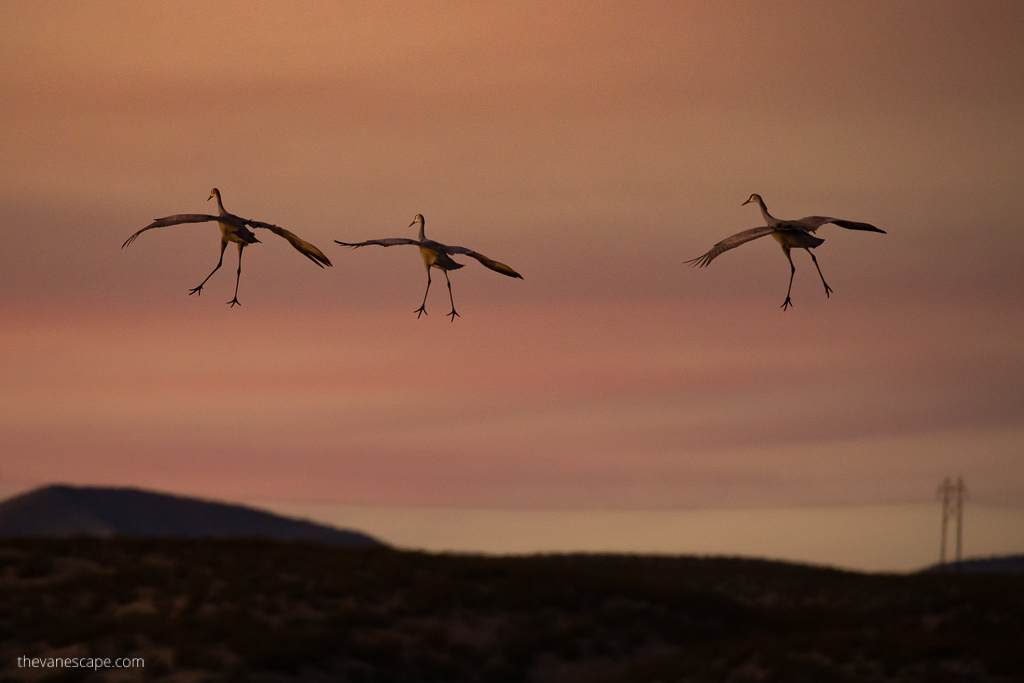
Choose The Best Spot For Sunrise
South Crane Pond For Sandhill Cranes
Interestingly, one of our most impressive performances takes place not in the park itself but at the water reservoir before the visitor center (if you are coming from Socorro). We were interested in Sandhill Cranes, which is why we chose South Crane Pond. We love these elegant birds, which dance with such grace.
You will see a long, narrow car park and water reservoir on the right (on the west side of Highway 1). Stop at South Crane Pond Parking next to Old US Highway 85 and admire this morning spectacle of Sandhill Cranes. During the morning fly-out, the pools are filled with thousands of Sandhill Cranes.
This pond has offered us the best opportunities for photographing silhouettes and mass takeoffs of Sandhill Cranes at sunrise. It is also a fantastic spot for sunset with its dramatic mountain backdrop.
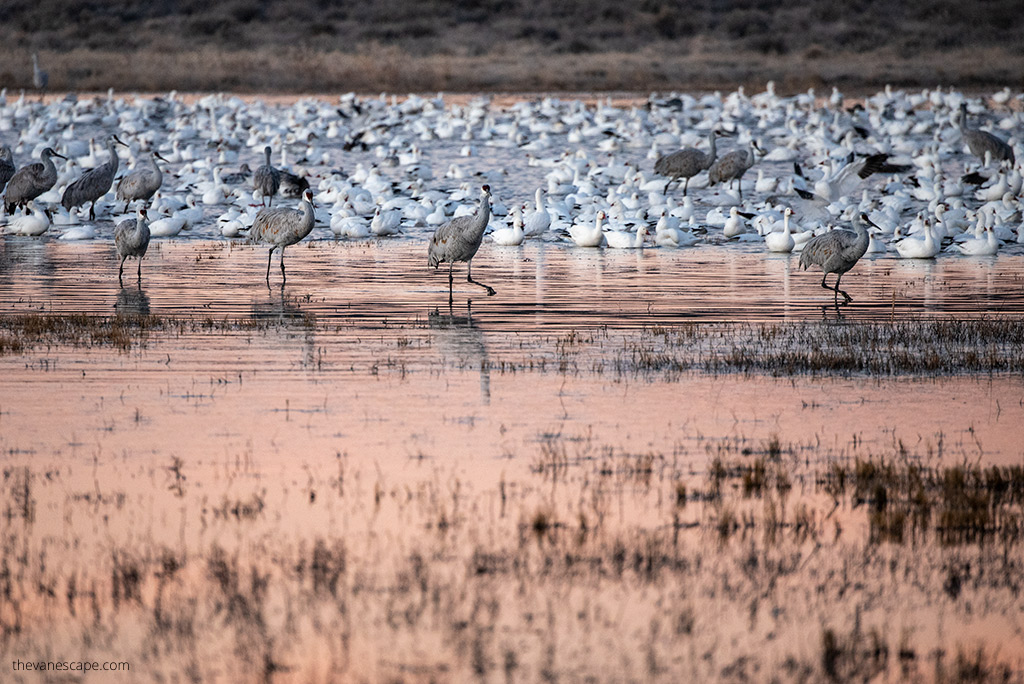
The Flight Deck For “Blast-Offs” of Snow Geese
However, if you have only one sunrise, you must choose what you want to photograph. The Flight Deck in the Refuge is the best place for sunrise photography. Take the first left after entering the reserve and then park about a half-mile later.
You won’t miss it; you will hear a gaggle of thousands of Snow Geese. The Flight Deck faces east, so you’re looking into the sunrise. Around dawn, the flock of thousands of geese will take off.
So, most bird photographers choose the “Flight Deck” waiting to capture the spectacular “blast-offs” of huge Snow Goose flocks at sunrise.
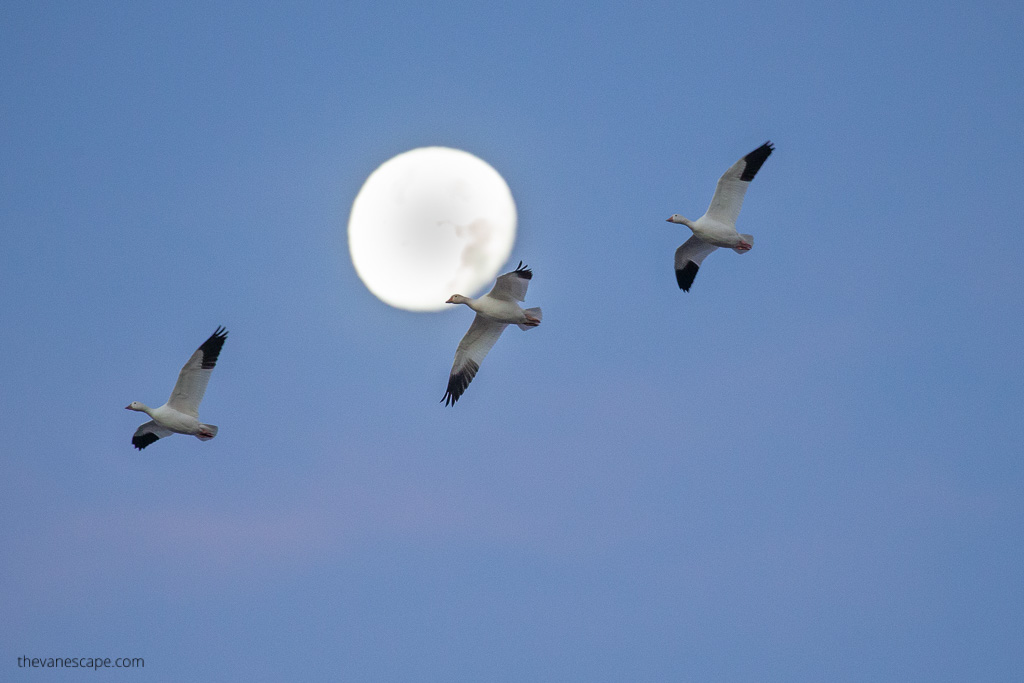
Be Patient And Watch The Birds Closely
Give yourself time to observe the birds and their habits. Before you go to Bosque, read about cranes and geese and their practices. You will be better prepared for your photography adventure in Bosque del Apache.
The more you know about any subject, the better off you’ll be when pressing the shutter. First of all, focus your attention on the birds’ behavior patterns. They have a daily routine. After the sunrise exodus, they fly to the farm fields at the north end of the refuge to feed.
They go back to their favorite ponds after sunset for the night. The birds take off into the wind. So, the most important is you know the wind direction.
Focus On Cranes Air Traffic Control System
Focus your attention on the morning fly-out. After a few minutes of careful observation of the Sandhill Cranes, you will notice that they have a fantastic system of rising into the air. It seems that they have their own air traffic control system. Each crane shows that it wants to float in the air, tilting its head down. It looks around for other birds.
Those who want to start flying are strolling towards the first crane. Birds are leaning forward and lowering their heads, ready to take off.
With its head in the lowest position, the bird at the front of the group usually takes off first. A small group of 3-5 surrounding cranes usually rises immediately after it.
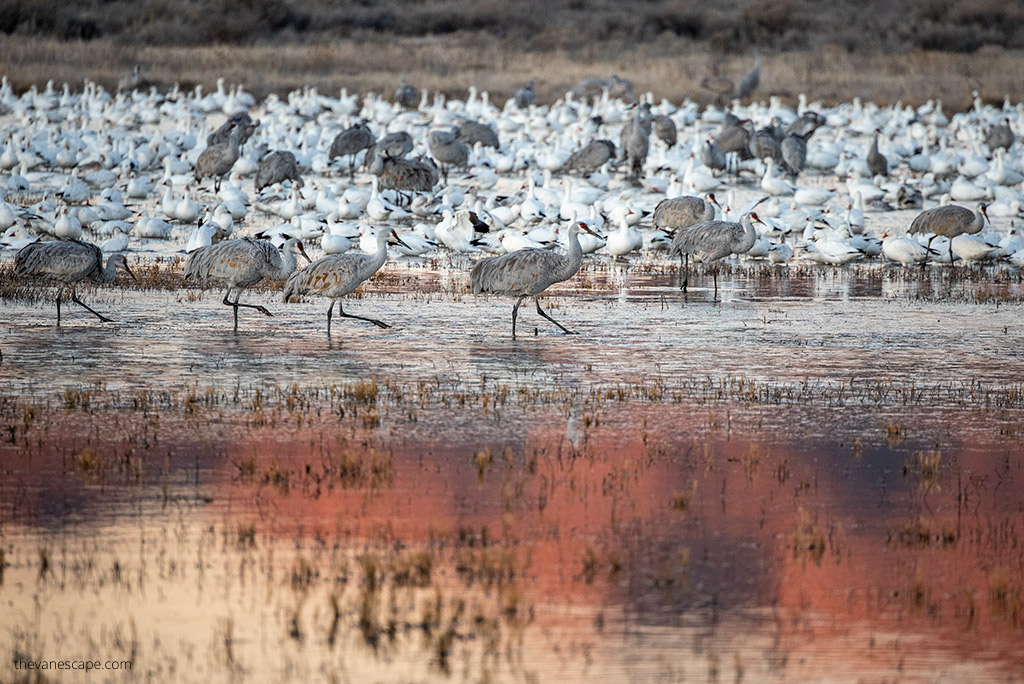
Use Zoom
If you plan to visit Bosque del Apache and are interested in bird photography, you will need some telephoto lenses, such as Sony FE 200-600mm, Sigma 150-600mm, Tamron SP 150-600mm, Nikon AF-S FX 200-500mm, or Canon EF 100-400mm.
Check our photo gear suggestions in this article.
Other than having big enough glass, you will want a camera with a robust autofocus system like Canon EOS-1DX or Nikon D5 and tripod. The huge blast-offs of snow geese happen at or before dawn, so it’s pretty dark.
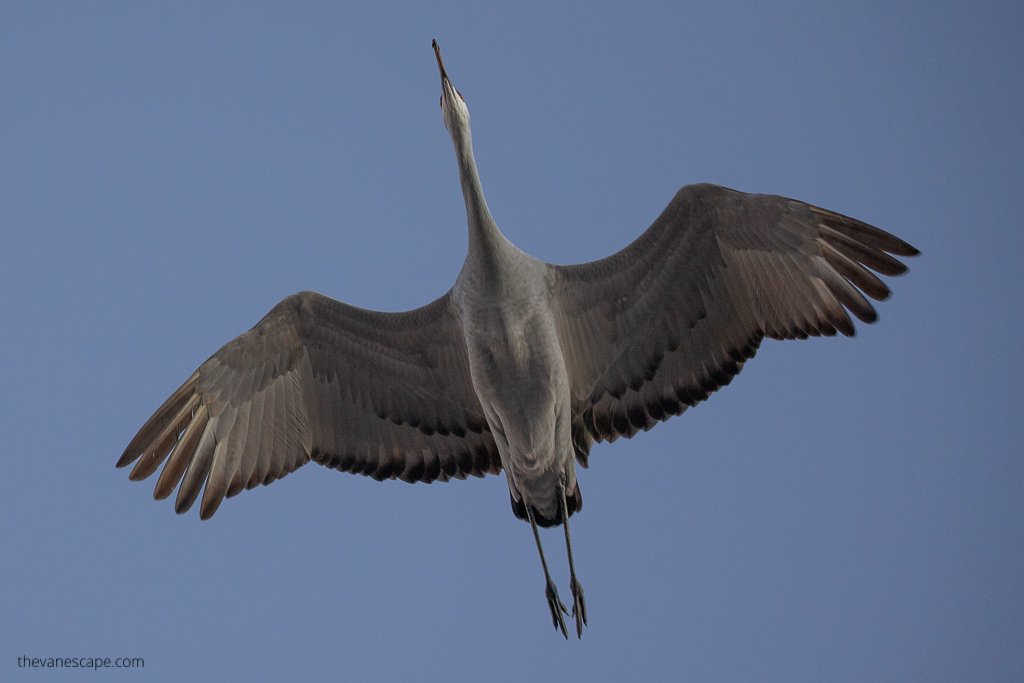
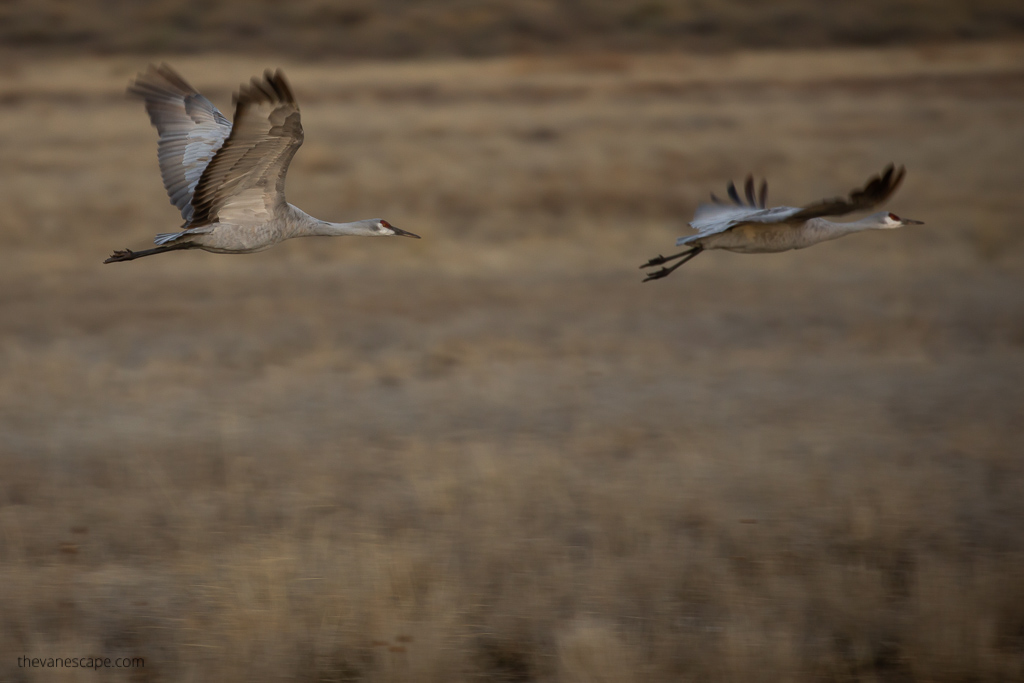
Take a Tour Loop On The Mid-Day
In the Midday, the birds’ flocks feed on the cornfields or wade in ponds. You will find them at many places in the Farm Loop. So, you can drive through this 12-mile-long road and observe nature. It is possible to drive and park almost anywhere to take photos.
There are hiking trails. However, the best photographic opportunities are right from the accessible viewing areas by the road. You can also see other birds and animals.
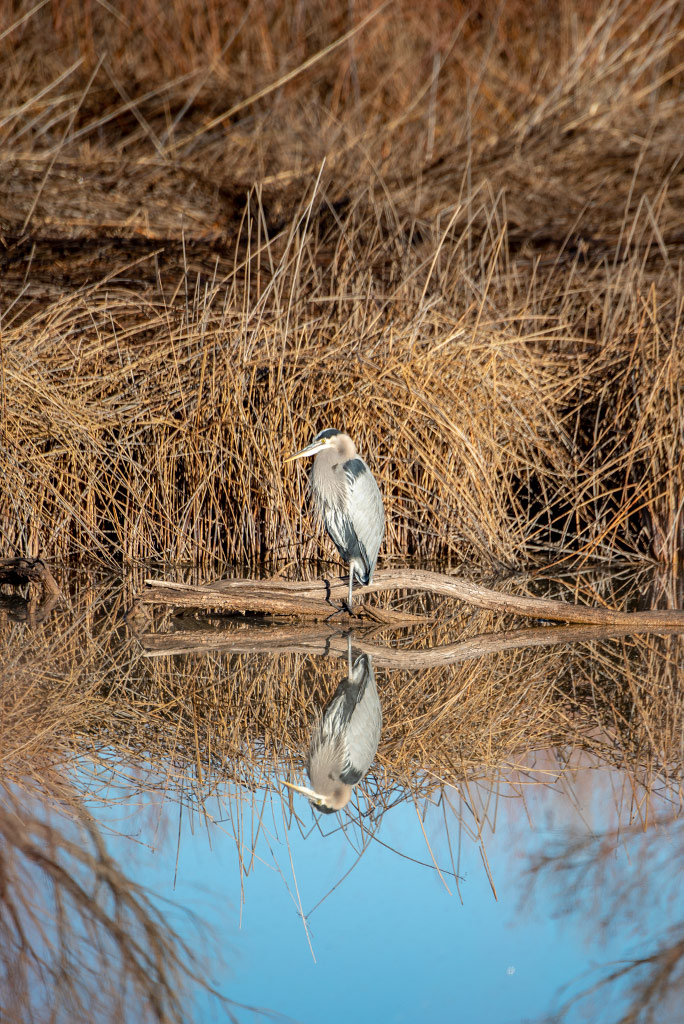
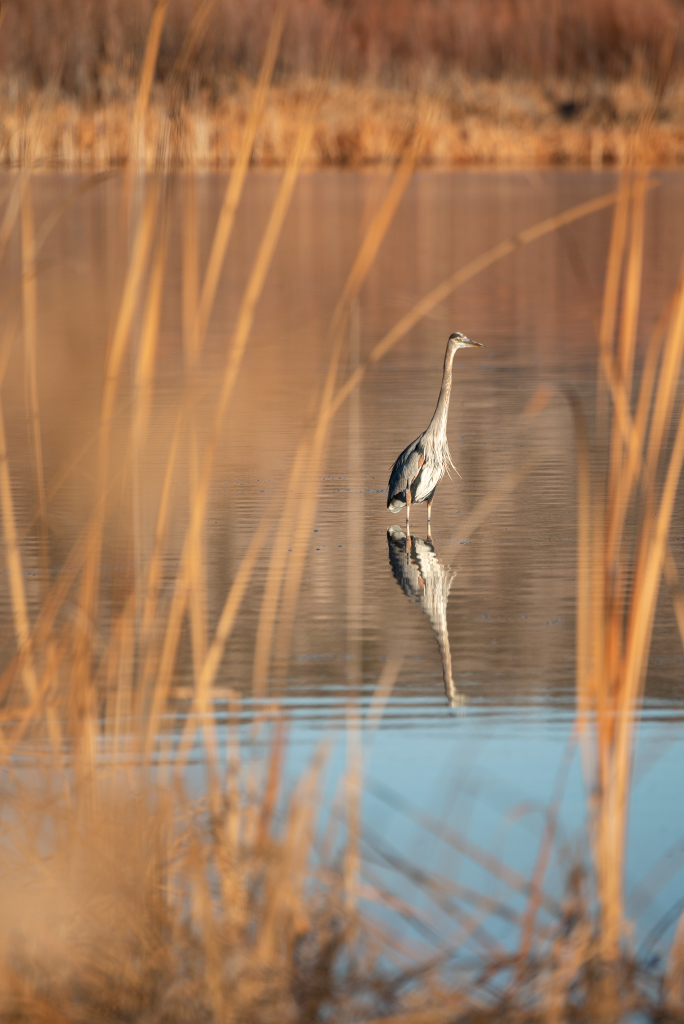
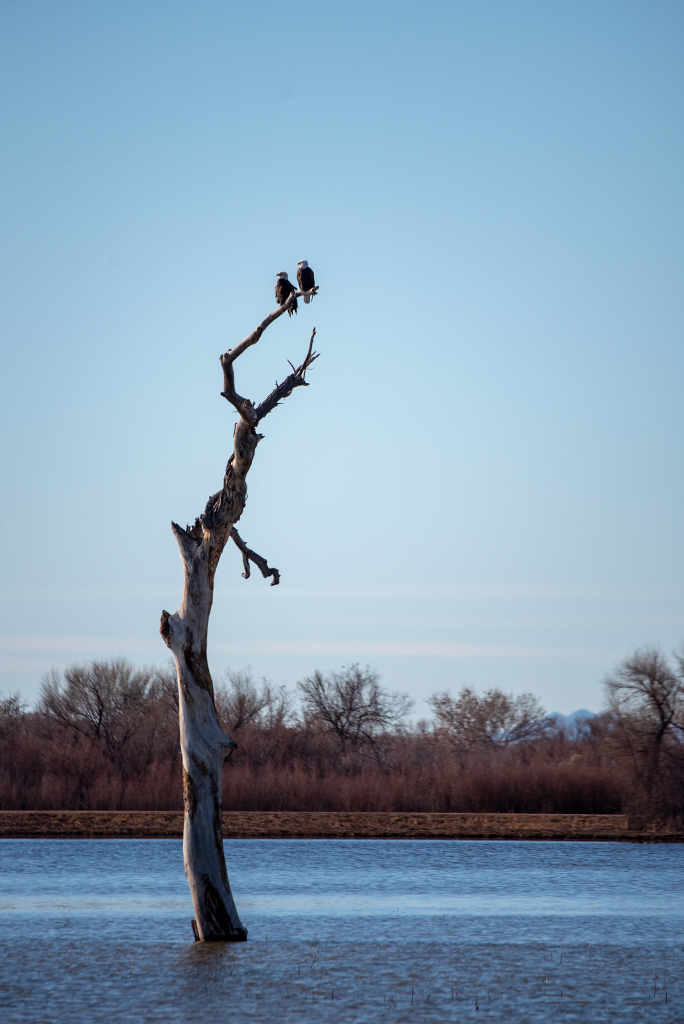
Think Of a Broader Frame
Look wider at the beauty that surrounds you. Bosque del Apache is impressive because of its breathtaking landscape, wide-open spaces, mountains, and trees. Therefore, the place looks phenomenal even after the birds depart.
So, take a wider lens, change perspective, and show the cranes or geese on the beautiful background, the sky, the mountains, fall colors, clouds, or reflections in the water.
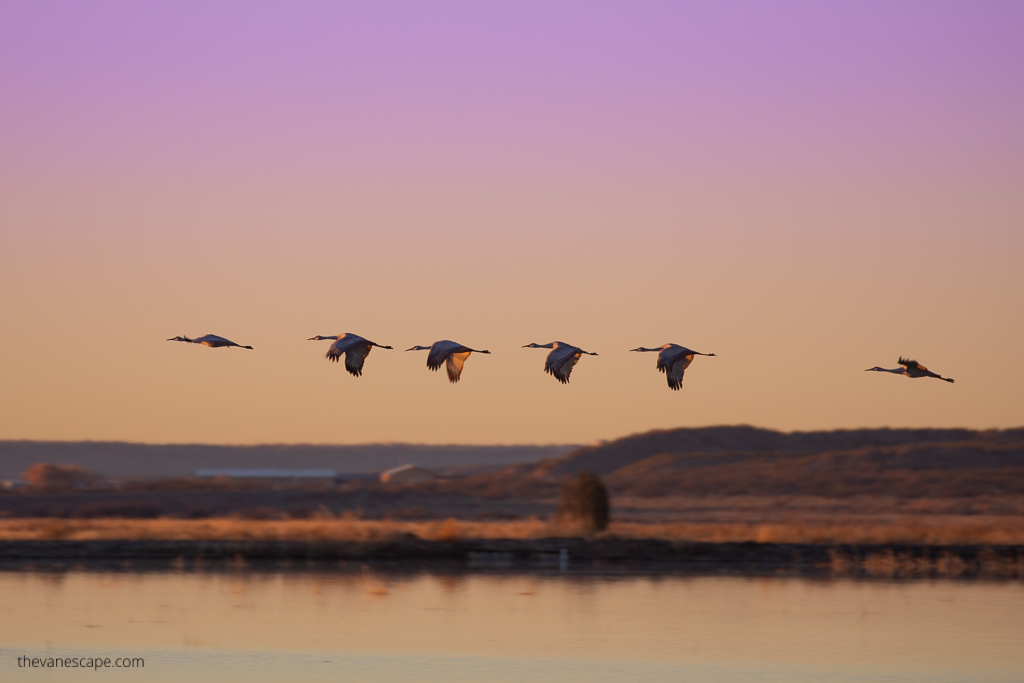
Finally, we assure you that even if you do not have a professional telephoto lens, you have the chance to take great photos of cranes and other wildlife in Bosque. Why? Because the place is magical. The birds and animals are quite close.
So, even with Nikkor 80-400mm, Canon 100-400mm, or Canon or Nikon’s wider but much brighter 24-70 zoom, it is possible to take great photos if you focus on a broader perspective.
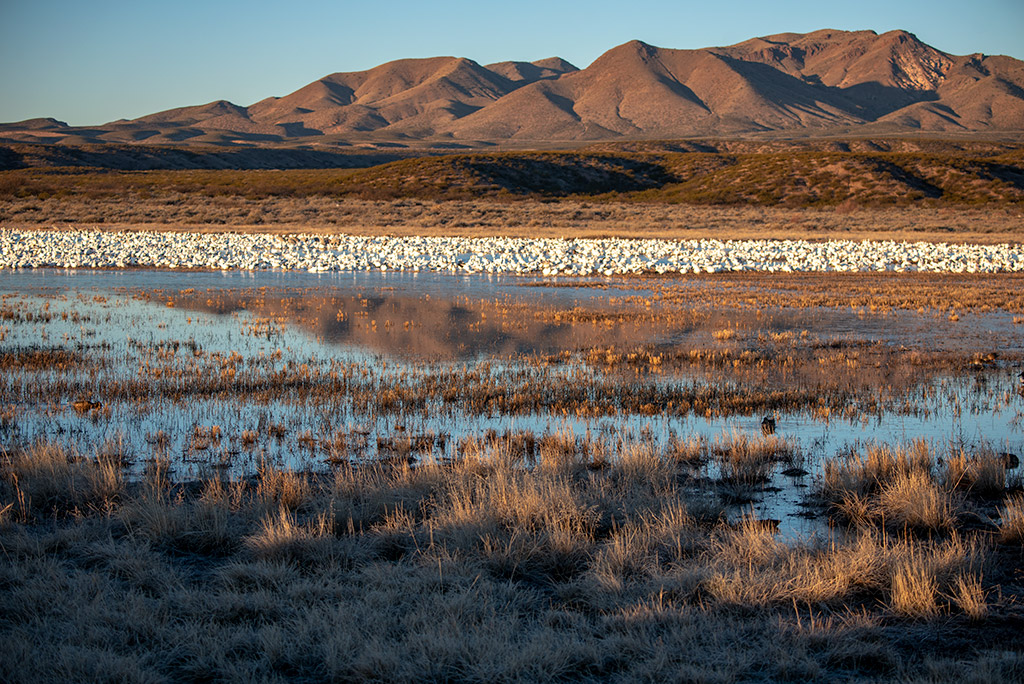
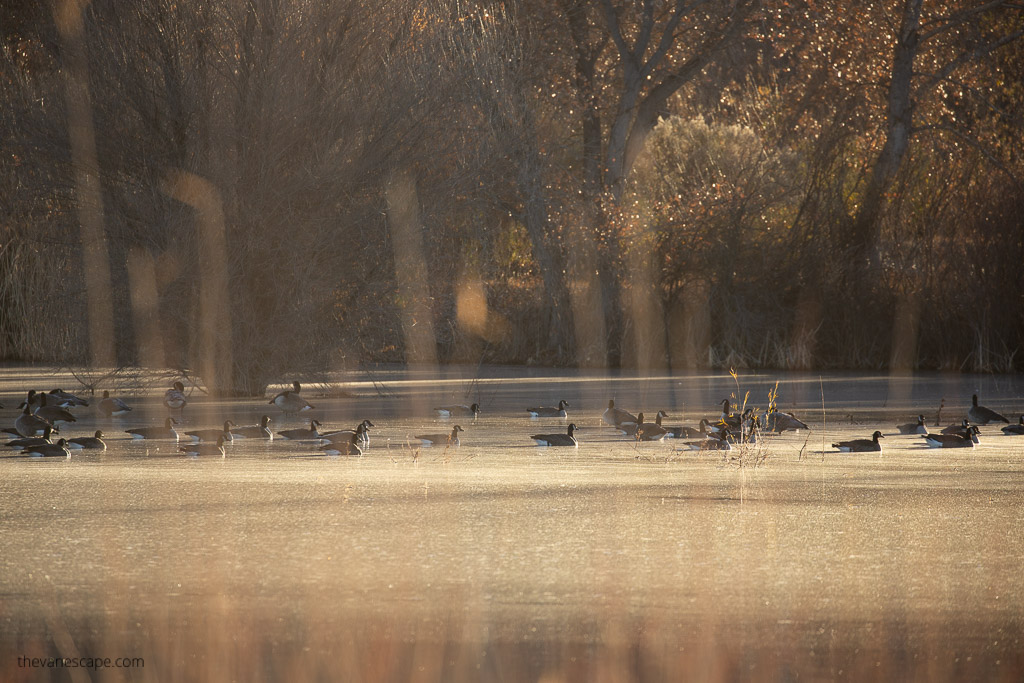
Remember About Manual Exposure
Manual exposure is a crucial ingredient for bird flight photography because of in-flight photography, we want our birds to be exposed appropriately at all times. So, manual mode allows us to set the proper exposure for our subject and ignore the influence of the background entirely.
Once you’ve dialed in the correct exposure for a crane, as long as the light doesn’t change, the bird will be exposed properly against any and every background.
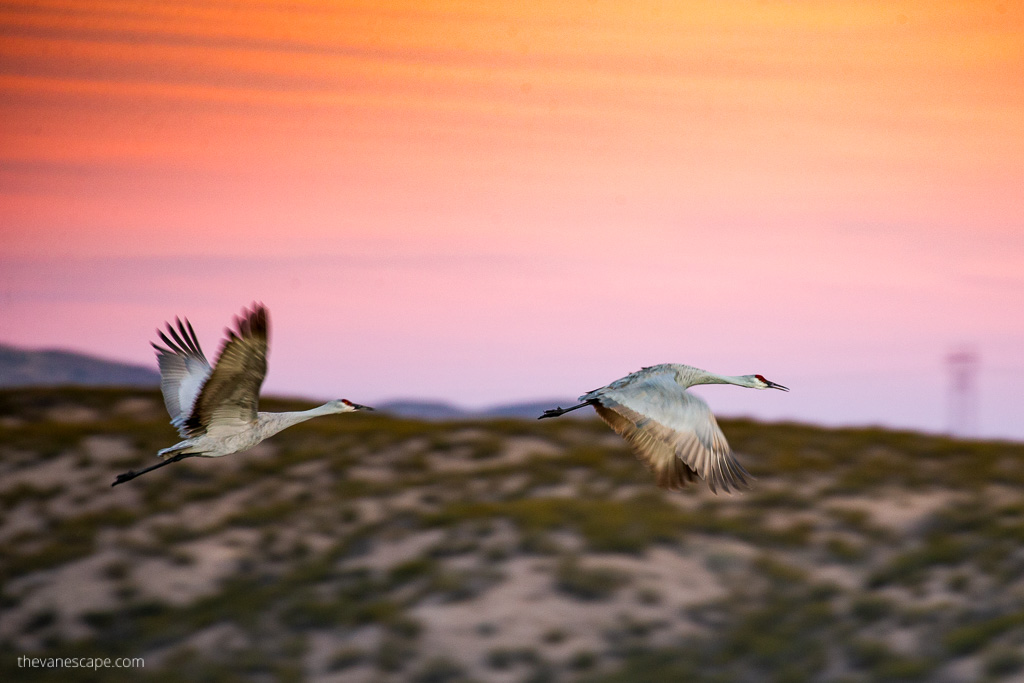
Stay For The Sunset
After a full day of wading in the cornfields and pools, the cranes rise again into the air. They fly to the next reservoir to rest. The birds always overnight in the same spot. So, sunsets are just as reliable as the sunrise. The light is also spectacular, and you can get amazing photos.
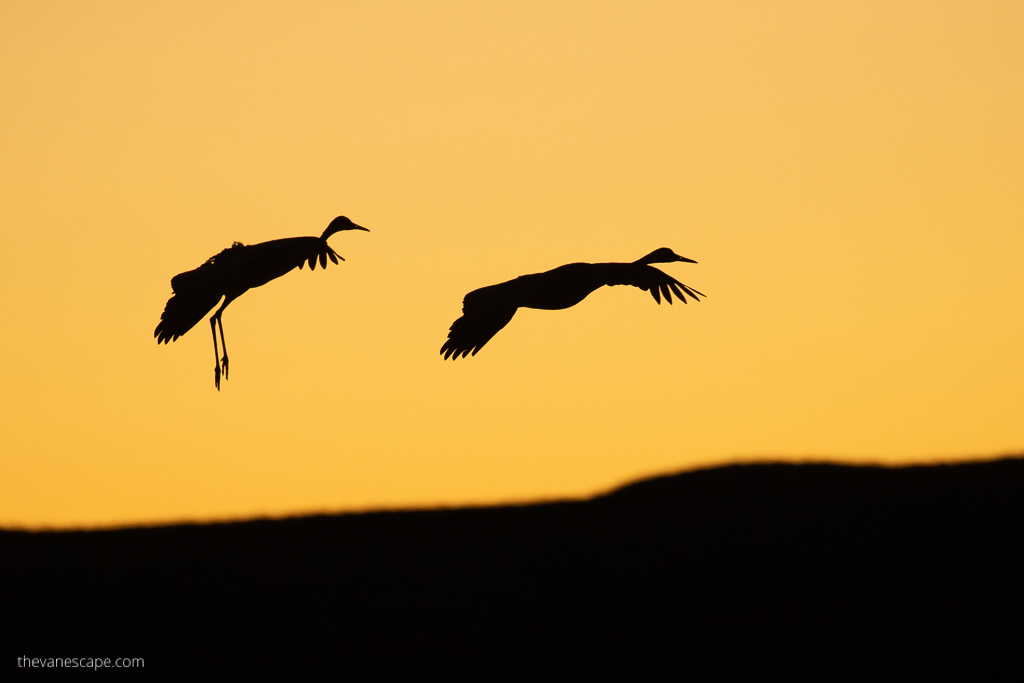
Your New Mexico Resources
If you are planning the New Mexico road trip; please check our related articles. We share our experience & tips to help you prepare for your incredible adventure:
- 3 Days Santa Fe Itinerary
- Carlsbad Caverns National Park Itinerary
- Taos Pueblo Tour
- Kasha-Katuwe Tent Rocks National Monument
- Visiting Roswell, New Mexico – A One-Day Itinerary
- 15 Best Things to Do in White Sands National Park
- 22 Best Things to Do in Farmington, New Mexico
- How to find the King of Wings New Mexico?
- How to find Alien Throne and Valley of Dreams New Mexico?
- The Ultimate Guide to Ah-Shi-Sle-Pah Wilderness Study Area
- Visiting Shiprock in New Mexico
- Hiking in Bandelier National Monument
- Hiking The Bisti/De-Na-Zin Wilderness New Mexico
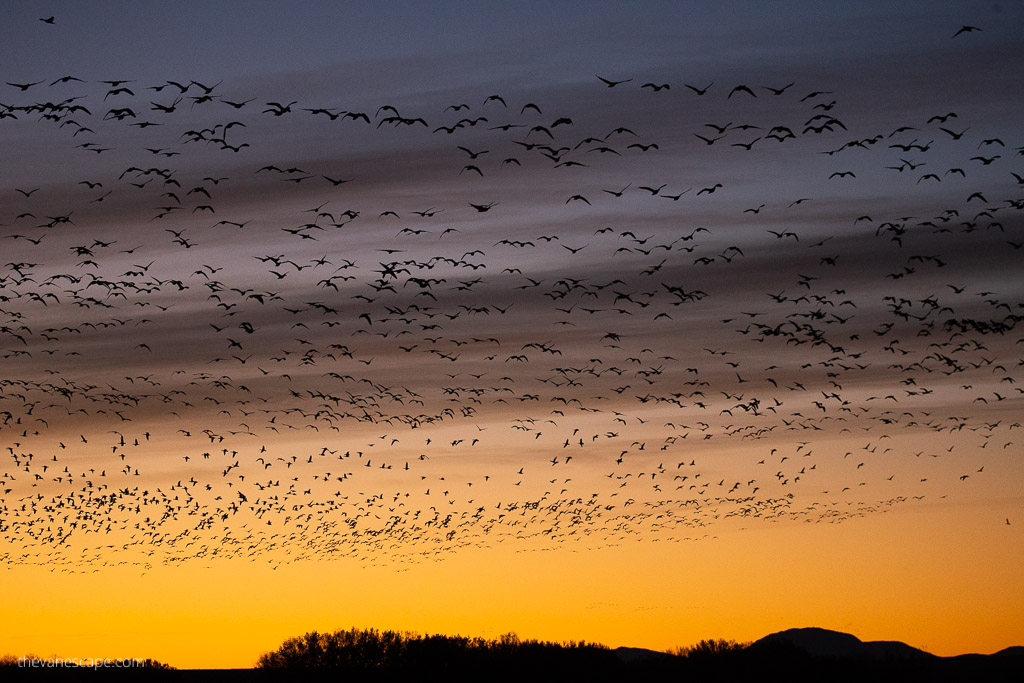
Do you like it? Pin it!
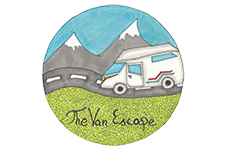
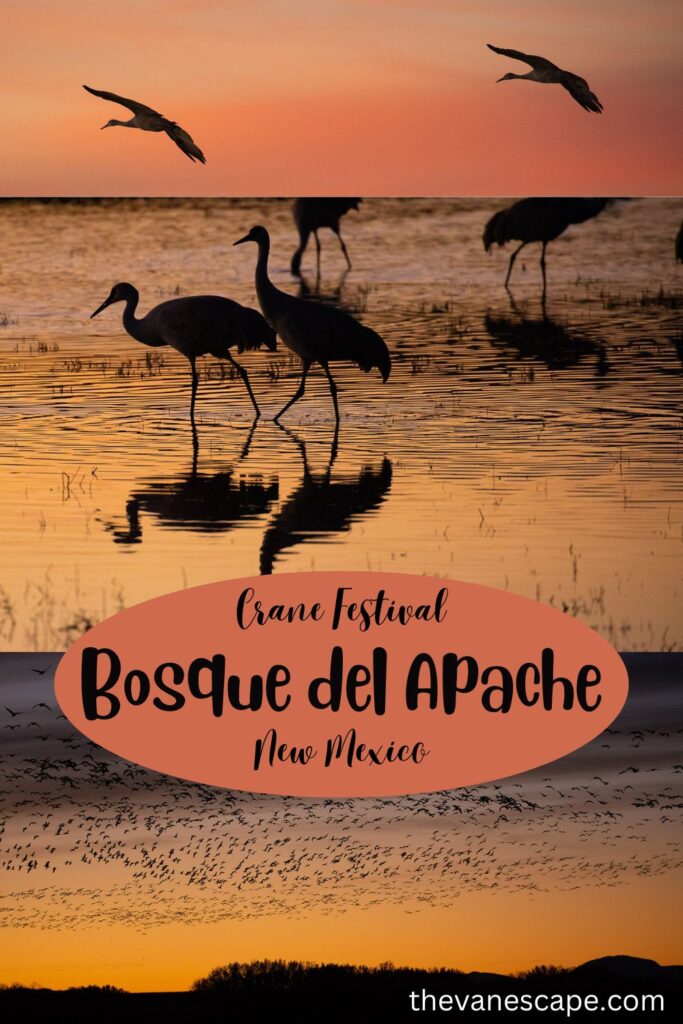
We are certainly sorry we did not know about this when we visited Albuquerque. Our daughter is an ornithologist and she would just love to spend time in the Bosque del Apache with over 350 different bird species. I am sure it must be amazing to see the Sandhill Cranes, Snow Geese and Ross’s Geese when they are they for winter migration. And being there at festival time must be quite magical. A good one to consider for the fall in 2021.
I was just trying to imagine what it would look like in the early morning when the snow geese came appeared near the water body! My imagination gave me something like what I see in your pictures, but on a smaller scale. The photographs are just wow! Bird photography is not easy. When we tried photographing some Himalayan birds and it was not an easy job. Thanks for sharing all the tips of photography. I would love to visit the Festival of Cranes some day! It is indeed a spectacle of nature.
What a fantastic tour through your article .. I loved all the photographs you have given here . Yes the place Bosque del Apache is impressive because of the breathtaking landscape, wide-open spaces, mountains, trees. And in order to capture a perfect shot of the cranes , geese it is defy true that one needs a lot of patience .. I myself have never done bird photography as I feel my gears will not justify the beauty as of now .. But ya the tips on lenses you have mentioned are noticeworthy.. I will surely look into it for my future purchase
what a fantastic place!! I loved all your photographs in the post. Basque del apache is breathtaking with landscape and mountains and off course the birds.Bird Photography is not easy and it requires patience.Loved you camera gears recommendations. This is spectacular place, would love to visit here someday.
OMG, this is a beautiful destination, and did you know that I also wish to see an actual bird crane? This bird has an important significance in our Asian culture, and it will be great to watch them even afar. I am also taking note of the lenses you recommend here. Perfect for my bird watching!
I absolutely love cranes! I think they are one of the most beautiful animals in the world. To see their beauty represented through such awesome photography was a great way to start my morning. I’m adding this to my bucket list, I had no idea that this was even an opportunity that I could pursue, thank you! Now, I’ll know how to get great photos too!
I am a wildlife lover and photographer and this place looks incredible! I have the canon 100-400mm lens that you mentioned and it’s brilliant, I have some incredible photos from it.
This is a very well-written and visually-stimulating article about a truly spectacular site. Thanks so much for your insight and photography tips. You obviously have a talent for photography and I thoroughly enjoyed taking this journey with you through your well-crafted words and professional and creative photography!
Let me just say this first. You’ve clicked some really amazing pictures. And Birds are so much tricky to capture, because they are usually unpredictable in their flight path. Reading this kinda reminded me of the time, i visited the Danube Delta, to see the migratory birds being themselves. Am definitely adding Bosque Del Apache festival of cranes to my bucket list.
I didnt know about this wildlife refuge before. It looks and sounds beautiful! Unfortunately, I am not a big bird person, but the scenery makes me want to go!
I think I’d have to go for sunrise and sunset. I love the muted peachy tones of the early morning light, it adds a tranquil glow to the photography, but at sunset you get such vivid swathes of color and the silhouettes of the birds are dramatic. What an amazing place. A festival indeed!
This was an amazing tour that you took me through. I love the innocence of birds and the view of cranes here gave me such a sense of calmness. Never knew about this festival though. Basque del apache is truly worth visiting with it’s beautiful landscape and mountains. Thank you for this wonderful virtual trip.
I would never of thought this was in New Mexico! I would love to go experience this myself some day. Your photos are absolutely stunning! I would for sure stay for sunset, it looks magical.
Wow, this places looks stunning. Thanks for the tips on how to get such great photos as yours. This guide is very useful. I’ve never been there or heard about this place but I would dlove to after this post. Thanks for sharing.
Wow! The first thing that came to my mind as I was reading and imagining this amazing place was I hope you’re monetising your photos. These photos should be on digital prints, calendars and magazine covers. They are truly beautiful. Thanks for the tips on how to use the manual exposure and I definitely be staying for the sunsets if I ever visit Bosque del Apache National Park.
I love photography so let me first say thanks to your photography tips really appreciated.